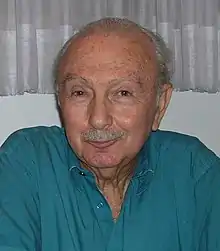Moshe Kochavi | |
|---|---|
 | |
| Born | 1928 |
| Died | 2008 |
| Known for | founding faculty member of Tel Aviv University's Department of Archaeology and Near Eastern Studies[1] |
| Scientific career | |
| Fields | Archeology of Israel |
Moshe Kochavi (Hebrew: משה כוכבי (1928–2008) was an Israeli archeologist and a founding faculty member of Tel Aviv University's Department of Archaeology and Near Eastern Studies.[1]
Biography
Born in Bucharest, Romania, Kochavi (birth surname: Stern) immigrated to Palestine with his parents at the age of 5.[2] Kochavi was drafted by the Palmach in 1947. He served in the Yiftach Brigade and was wounded during Operation Yoav.[1][3]
Kochavi began studying archeology at the Hebrew University of Jerusalem in 1955 under Yohanan Aharoni, and he received his Ph.D. from that institution. After the 1967 Six-Day War Kochavi carried out the first thorough survey of the Judean Hills. In 1968 he joined Tel Aviv University's Department of Archaeology.[4] He led Tel Aviv University's excavation at Tel Hadar between 1987 and 1995 as part of the Land of Geshur Project.[5][6]
Kochavi was one of numerous archaeologists who in 2007 petitioned the Supreme Court of Israel to order an immediate cessation of digging operations being performed by the Jerusalem Islamic Waqf on the Temple Mount.[7]
Works
- Kochavi, Moshe, ed. (1972). Judea, Samaria and the Golan: Archaeological Survey 1967-1968. Jerusalem: The Archaeological Survey of Israel and Carta.
See also
References
- 1 2 3 Resig, Dorothy D. (20 November 2008). "Moshe Kochavi (1928–2008)". Biblical Archaeology Review. Bible History Daily. Archived from the original on 6 June 2017. Retrieved 13 April 2013.
- ↑ Dromi, Uri (1 March 2008). "חושף צפונות אפק וארץ גשור". Haaretz (in Hebrew). Retrieved 13 April 2013.
- ↑ "Kochavi Moshe (Kochavi): Son of Samuel". Palmach Information Center. Archived from the original on 17 October 2012. Retrieved 13 April 2013.
- ↑ Yadin, Esther (2008). "In Memoriam: Moshe Kochavi (1928-2008)" (PDF). Tel Aviv University. Retrieved 13 April 2013.
- ↑ Günter, Kopce (2002). Ehrenberg, Erica (ed.). Leaving No Stones Unturned: Essays on the Ancient Near East and Egypt in Honor of Donald P. Hansen. Eisenbrauns. p. 109. ISBN 1-57506-055-8. Retrieved 13 April 2013.
- ↑ Meyers, Eric M., ed. (2011). "Hadar, Tel". The Oxford Encyclopedia of Archaeology in the Near East. Oxford University Press. ISBN 9780199892280. Retrieved 13 April 2013.
- ↑ Shragai, Nadav (9 September 2007). "אנשי ציבור עתרו נגד חפירות הוואקף בהר הבית". Haaretz (in Hebrew). Retrieved 13 April 2013.